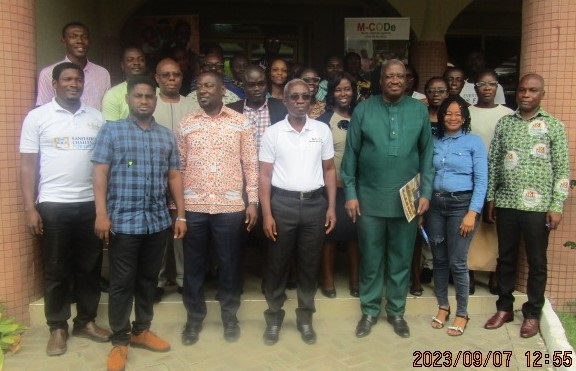The participants in a group photograph
Open defecation has become a grave social and health issue that affects coastal communities nationwide.
This is because the consequences of open defecation are severe, impacting individual health, public health, and the overall socio-economic development of the coastal areas.
The spread of diseases such as cholera, diarrhoea, and typhoid due to poor sanitation practices are also prevalent in those areas.
To this end, the Media Coalition against Open Defecation (M-CODe) established in 2018 is poised to supporting the crusade against Open Defecation in the country.
This came to light at the official launch of the Western Regional branch of M-CODE to help fight the canker in the region.
The event was attended by key stakeholders from the government agencies and the media.
In an address read on his behalf, the Western Regional Minister, Kwabena Okyere Darko-Mensah noted that despite substantial development in various sectors, the prevalence of open defecation remains a major challenge.
He added that diseases caused by open defecation normally claimed the lives of innocent people and negatively impacted productivity, particularly among marginalized communities.
“We must break this cycle, and it starts with a united front against open defecation,” he said.
The National Convenor for M-CODe, Francis Ameyebor pointed out that as major stakeholders, the media is determined to help end open defecation by 2030.
He, therefore, called on the media practitioners to sensitize the various assemblies to enforce the laws by making sure that there is a toilet facility in every new building being approved by the assemblies.
“In case there are new buildings without toilet facilities, the media must link it to the MMDAs and ensure that the right thing is done”, he suggested.
He said, “The Sustainable Development Goal (SDG) six is aimed at ending open defecation by 2030. To be able to end this menace, there must be an advocacy and an attitudinal change.”
“Some of the problems are basically attitudinal change, people are refusing to defecate in privacy claiming they enjoy it in the open because of free range.”
World Vision Ghana’s Water, Sanitation and Hygiene (WASH), Technical Specialist, Yaw Attah Arhin, said, “It is sad to observe that over 3000 children die every year from diseases like diarrhoea.
“This is preventable with interventions such as the use of improved toilet facilities and hand washing with soap under running water”, he revealed.
From Emmanuel Opoku, Takoradi


